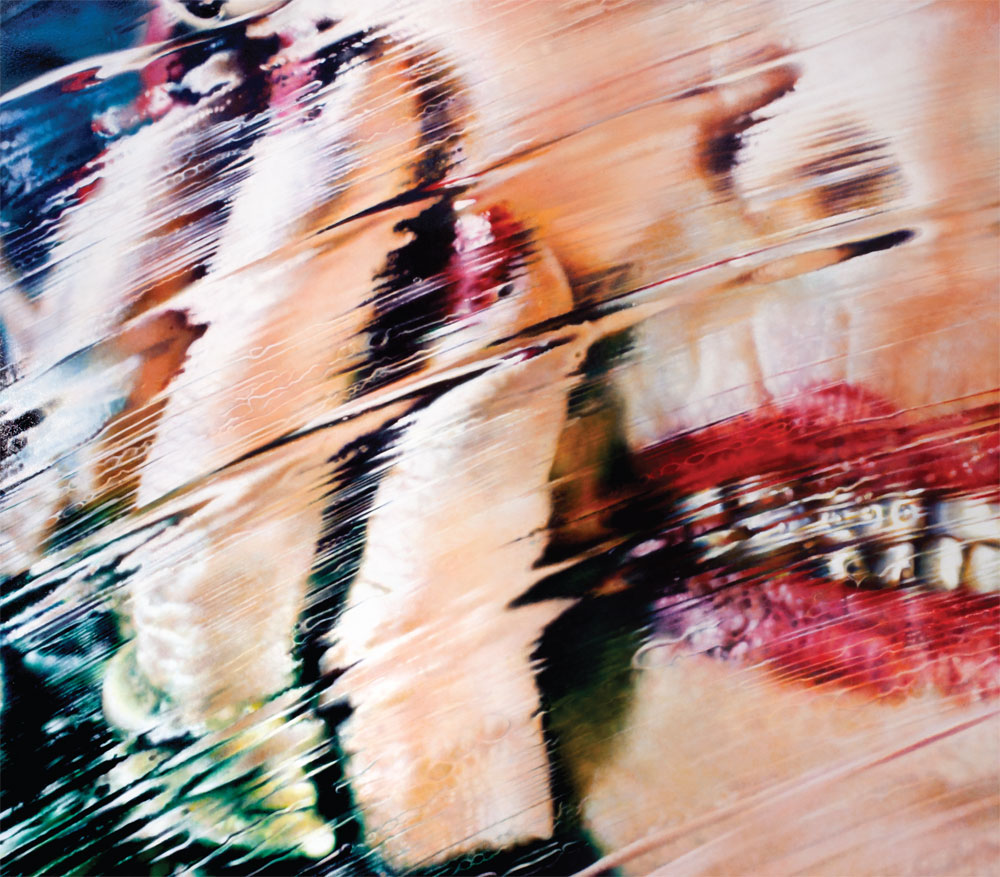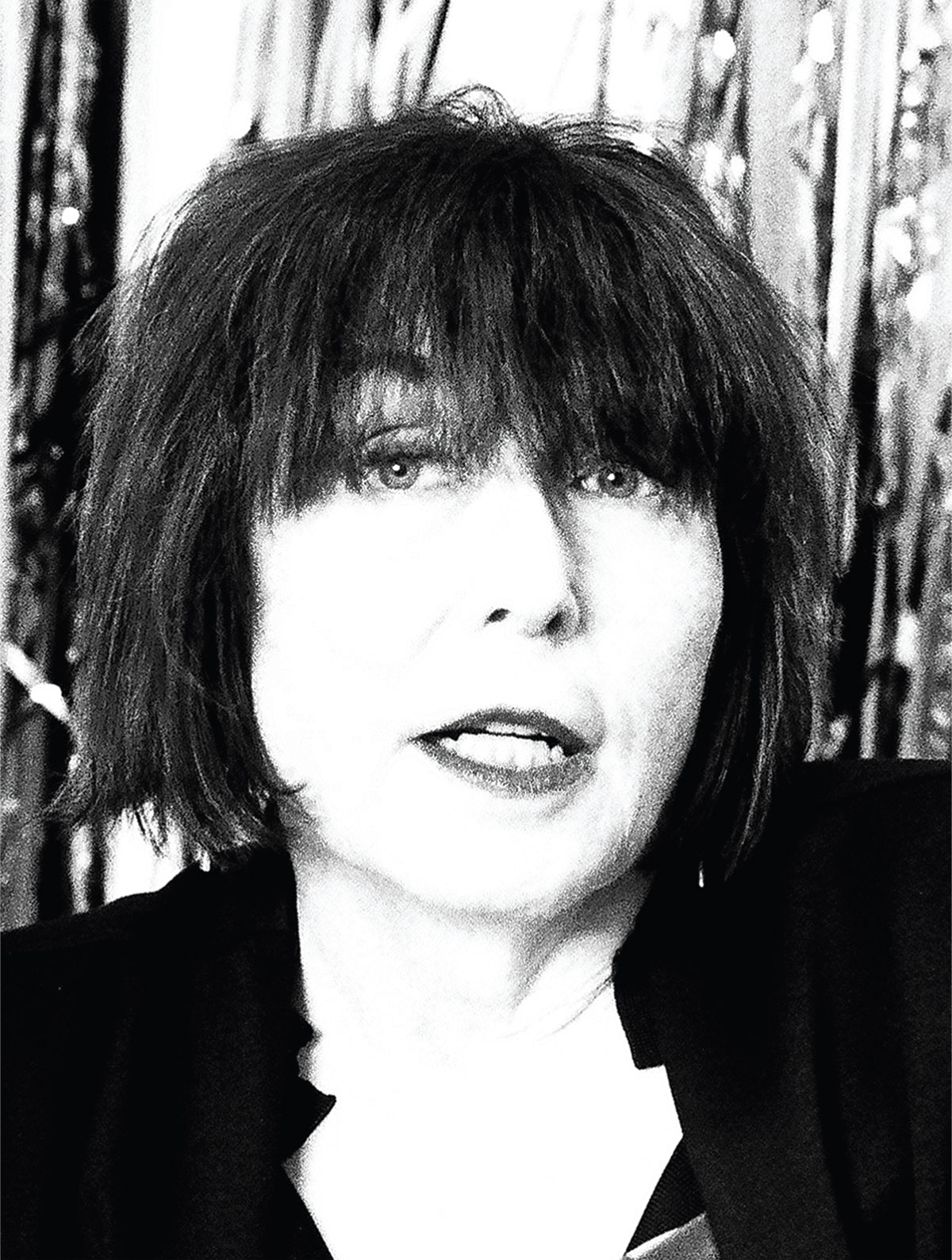
This article appears in the August Issue of VICE MagazineThe painter Marilyn Minter is having her first retrospective, which represents 45 years of the artist's work and will open next month at the Museum of Contemporary Art in Denver before traveling to Orange County and Brooklyn in 2016. When I arrived at Minter's bustling Manhattan studio, another visitor was preparing to leave. "This is Fabiola. We did Plush, the pubic series, together!" exclaimed an ebullient Minter, introducing me to the publisher of her limited-edition book that featured close-ups of hair-coated vaginas being stroked by manicured hands. "Richard Prince bankrolled it, and it sold out in a week! Five hundred copies."
Advertisement
She proceeded to lead me through her workshop, where her assistants tend to sit quietly, applying layers of enamel to several large-scale, highly detailed images, most of which are painted as though seen through glass—a frosted or textured window, a steamy shower door. Both sublime and lurid, Minter's work is populated by splashes, spills, and those little dots of light that appear when a camera is out of focus. Gesturing toward a painting of an aging female face with red lipstick and gold teeth, partly blurred by windshield-wiper-like marks, Minter said, "This is like if you drove past a billboard with a wrinkled lady on some rainy night… Of course you never would see an advertisement of a woman with wrinkles." Much of the artist's oeuvre invokes the aesthetics of fashion photography yet focuses on images that we rarely see represented in that form: the reddish creases that socks leave on ankles, freckles, dirt in between toes and on nails.While Minter's talent has always been for conceptually oriented representation, in her early days she was told she was simply a photorealist, and a boring one at that—abstract expressionism was still de rigueur at the University of Florida when Minter studied there in the late 60s. At 21, she shot Coral Ridge Towers, an exquisite and arresting black-and-white series of domestic portraits of her mother, a glamorous-looking drug addict. Her classmates were scandalized and "horrified" by the images, sensing that they had been shown too much. Ashamed, Minter put the photographs away for 25 years. This would not be the last time her work caused a stir. At the end of the 80s, after a failed attempt to become an expressionist, a more conventional pop art phase in which she employed a dot screen, and a couple trips to rehab in order to kick her own addictions, Minter developed a fresh new style and process, using enamel paint to depict close-up images taken from hardcore pornography. Porn Grid, a graphic quadriptych of blowjobs and breasts, features drips of orange, red, and white, as though the paintings themselves were enjoying an orgasm. (Think: Pat Steir Does Dallas.) Condemned by anti-porn feminists who considered her nothing more than a patriarchal collaborator, Minter was effectively exiled from the art world. Only when Minter revealed the portraits of her mother from decades before was she allowed back in. "Because if you come from dysfunction, you're legitimized as an artist," Minter explained. "Are we that predictable? It's such a corny story."
Advertisement
In the past 20 years, Minter has come to be regarded as one of our most important living artists, and her work continues to deepen. Lately she has escaped the role of "unwitting provocateur," but it doesn't seem that she'll be putting trigger warnings on any of her paintings in the near future.Read on i-D: Marilyn Minter's Art Is Literally Filthy Gorgeous

How does it feel to be touring your first major retrospective?
It's pretty cool. I've always suspected that I've kept making the same image over and over since I was 12. When all the work was put together it was clear to me: It's about the overlooked. You know, sweating, or getting your feet dirty—with a nice manicure. These images always look really beautiful to me. None of them look disgusting to me. They could be alluring and at the same time make you uncomfortable because we as a culture want to tidy everything up. I believe in the untidy.Does this connect to your views on pubic hair? How did Plush come about?
A lot of boys your age have never seen female pubic hair. I was trying to make it look attractive, so that young girls wouldn't get laser surgery. I don't care what they do, but I don't want them to get laser. Because fashion changes. And then they're stuck being baldies.Baldies from another time. You always say fashion is "debased" in our culture.
It's easy to kick the fashion industry. It's so easy! But it gives so many people pleasure and tells them what tribe they're from. This is how we greet one another. It's so primal. Advertising images are not shallow. They're almost the most important thing around.
It's pretty cool. I've always suspected that I've kept making the same image over and over since I was 12. When all the work was put together it was clear to me: It's about the overlooked. You know, sweating, or getting your feet dirty—with a nice manicure. These images always look really beautiful to me. None of them look disgusting to me. They could be alluring and at the same time make you uncomfortable because we as a culture want to tidy everything up. I believe in the untidy.Does this connect to your views on pubic hair? How did Plush come about?
A lot of boys your age have never seen female pubic hair. I was trying to make it look attractive, so that young girls wouldn't get laser surgery. I don't care what they do, but I don't want them to get laser. Because fashion changes. And then they're stuck being baldies.Baldies from another time. You always say fashion is "debased" in our culture.
It's easy to kick the fashion industry. It's so easy! But it gives so many people pleasure and tells them what tribe they're from. This is how we greet one another. It's so primal. Advertising images are not shallow. They're almost the most important thing around.
Advertisement
But Quentin Crisp said, "Fashion is instead of style. If you don't know who you are, you consult the glossy papers."
Another truth. That's where I always am—all of this is true. We can hold all of these ideas in the same conversation. My favorite is Cocteau's. "We must forgive fashion everything because she dies so young." Isn't that brilliant? I wish I'd thought of it!You've often said, "Nobody has politically correct fantasies." We're seeing a resurgence of political correctness. On the left, in academia, and in the arts there are all these internecine language squabbles. This is becoming the age of trigger warnings—
I hate that! I'm a progressive, and I'm horrified by progressives getting more conservative.How do you see that playing out?
Trigger warnings! It makes me crazy! I'm against all censorship. Unless: cruelty to children and animals. Otherwise the answer is to create in response to something you don't like. Repression leads to distortion. Shaming is disastrous. Shame is the worst thing you can put on other people.No major female artist had worked with porn in the way you did. But you were not rewarded for it at the time, to say the least.
I was surprised by the reaction. But there was that whole fear factor from the first-wave feminists. Repurposing or reclaiming sexual images was unheard of for them, though now it seems so normal. But if you're young it's still very threatening to both women and men. I've said this before, but there's the famous picture of Louise Bourgeois by Robert Mapplethorpe, where she's holding that giant dildo. She looks so adorable! She's a post-menopausal old lady. But if Miley Cyrus does it, look at the kind of blowback she gets.
Another truth. That's where I always am—all of this is true. We can hold all of these ideas in the same conversation. My favorite is Cocteau's. "We must forgive fashion everything because she dies so young." Isn't that brilliant? I wish I'd thought of it!You've often said, "Nobody has politically correct fantasies." We're seeing a resurgence of political correctness. On the left, in academia, and in the arts there are all these internecine language squabbles. This is becoming the age of trigger warnings—
I hate that! I'm a progressive, and I'm horrified by progressives getting more conservative.How do you see that playing out?
Trigger warnings! It makes me crazy! I'm against all censorship. Unless: cruelty to children and animals. Otherwise the answer is to create in response to something you don't like. Repression leads to distortion. Shaming is disastrous. Shame is the worst thing you can put on other people.No major female artist had worked with porn in the way you did. But you were not rewarded for it at the time, to say the least.
I was surprised by the reaction. But there was that whole fear factor from the first-wave feminists. Repurposing or reclaiming sexual images was unheard of for them, though now it seems so normal. But if you're young it's still very threatening to both women and men. I've said this before, but there's the famous picture of Louise Bourgeois by Robert Mapplethorpe, where she's holding that giant dildo. She looks so adorable! She's a post-menopausal old lady. But if Miley Cyrus does it, look at the kind of blowback she gets.
Advertisement
With female pop stars there's always the question of agency—whether you're owning the sexuality.
Does Madonna own it? You bet your ass she does!
Does Madonna own it? You bet your ass she does!

Though they are friendly, Bell Hooks recently told Laverne Cox that she was playing into a patriarchal vision in the way she presents herself.
That's the left's shaming of glamour.When you got so much flak, how did you keep going?
I had two thoughts. One was that I wasn't communicating, that I wasn't getting my thoughts across. And two: If you think this is bad, wait till you see what I do next.So you kept pushing it and tried to go further.
Yes, I had enough of a support system to know I was doing the right thing. And there was this organic flow—I was playing with lipsticks being phallic. They were getting longer, longer than the tube. And that translated into advertising, which mutated into what I do now. From Plush I got into the steam. I'm going to be working with steam for a while now.Are the mother photos the earliest work in the retrospective?
Yes. And when you look at the arc of my history—I was brought up by this woman who happened to be a drug addict, and who was very glamorous and beautiful, but was always off. So it's not like I invented this story about an off-kilter beauty. It's all I knew. It's who I am. I actually see things like this. There are certain groups of your work that didn't make an impact at the time but had a delayed effect.
That happens with women artists. We're going to see a woman hit that white heat, but we haven't yet. Marina [Abramovic´] and Cindy [Sherman] are both really fantastic artists who have contributed to art history in a major way. I'm proud that they're even approaching the white heat. They haven't been burned out by it. It's too soon. Jeff Koons is the only one I can think of who still makes amazing work after being in that heat for quite a while. It's very difficult to survive it, but women don't get that opportunity. I have enough success to keep going. I'm like a choo-choo train.You have to be in it for the long haul. But would you say that now there's an ever-increasing expectation for a young artist to arrive formed?
It's impossible! I feel really bad for all the artists who are in the rubric of zombie formalism because there could be some real talent in there. There are investors treating art as a commodity and artists as pork bellies. You can't just come into this world without learning the language. They're using a Wall Street algorithm on a secret language. Some people know right away where there's fresh vision, but most people don't. And if there's a way to take advantage of an artist, it's going to happen. Because we want so much to believe that we have admirers.I know a few of your former students, and it's clear how fond they are of you, how much they respect you, and how important your influence has been. How do you think about your role as a teacher?
Sometimes I wonder if I'm a good artist, but I know I'm a good teacher. It doesn't sound very humble, but I have seen that I can show young artists where they're good. I've got so many formal skills, and I know when someone has something I don't have. I believe that the thing that comes really easy to you is what you should be exploring. They're always throwing it away because they think it's too easy. I fight my students to convince them that you can't exhaust it and you won't come to a dead end. I've heard other teachers say, "You should challenge yourself. Don't do that thing you already know how to do." Well, there are going to be plenty of challenges in embracing your gifts.
That's the left's shaming of glamour.When you got so much flak, how did you keep going?
I had two thoughts. One was that I wasn't communicating, that I wasn't getting my thoughts across. And two: If you think this is bad, wait till you see what I do next.So you kept pushing it and tried to go further.
Yes, I had enough of a support system to know I was doing the right thing. And there was this organic flow—I was playing with lipsticks being phallic. They were getting longer, longer than the tube. And that translated into advertising, which mutated into what I do now. From Plush I got into the steam. I'm going to be working with steam for a while now.Are the mother photos the earliest work in the retrospective?
Yes. And when you look at the arc of my history—I was brought up by this woman who happened to be a drug addict, and who was very glamorous and beautiful, but was always off. So it's not like I invented this story about an off-kilter beauty. It's all I knew. It's who I am. I actually see things like this. There are certain groups of your work that didn't make an impact at the time but had a delayed effect.
That happens with women artists. We're going to see a woman hit that white heat, but we haven't yet. Marina [Abramovic´] and Cindy [Sherman] are both really fantastic artists who have contributed to art history in a major way. I'm proud that they're even approaching the white heat. They haven't been burned out by it. It's too soon. Jeff Koons is the only one I can think of who still makes amazing work after being in that heat for quite a while. It's very difficult to survive it, but women don't get that opportunity. I have enough success to keep going. I'm like a choo-choo train.You have to be in it for the long haul. But would you say that now there's an ever-increasing expectation for a young artist to arrive formed?
It's impossible! I feel really bad for all the artists who are in the rubric of zombie formalism because there could be some real talent in there. There are investors treating art as a commodity and artists as pork bellies. You can't just come into this world without learning the language. They're using a Wall Street algorithm on a secret language. Some people know right away where there's fresh vision, but most people don't. And if there's a way to take advantage of an artist, it's going to happen. Because we want so much to believe that we have admirers.I know a few of your former students, and it's clear how fond they are of you, how much they respect you, and how important your influence has been. How do you think about your role as a teacher?
Sometimes I wonder if I'm a good artist, but I know I'm a good teacher. It doesn't sound very humble, but I have seen that I can show young artists where they're good. I've got so many formal skills, and I know when someone has something I don't have. I believe that the thing that comes really easy to you is what you should be exploring. They're always throwing it away because they think it's too easy. I fight my students to convince them that you can't exhaust it and you won't come to a dead end. I've heard other teachers say, "You should challenge yourself. Don't do that thing you already know how to do." Well, there are going to be plenty of challenges in embracing your gifts.
